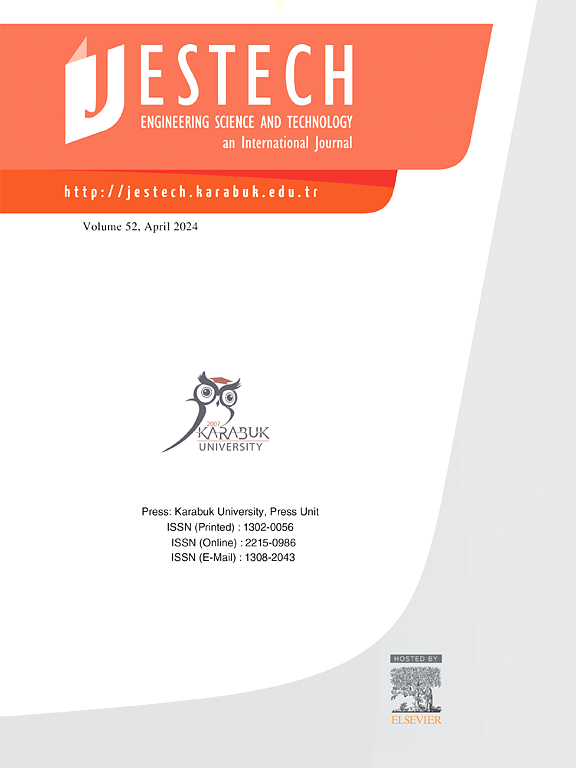Bayesian curriculum generation in sparse reward reinforcement learning environments
IF 5.1
2区 工程技术
Q1 ENGINEERING, MULTIDISCIPLINARY
Engineering Science and Technology-An International Journal-Jestech
Pub Date : 2025-04-10
DOI:10.1016/j.jestch.2025.102048
引用次数: 0
Abstract
This paper introduces the Bayesian Curriculum Generation Algorithm, a sophisticated approach for curriculum learning in sparse reward reinforcement learning contexts. Diverging from traditional methodologies, this algorithm utilizes Bayesian networks to dynamically create tasks by altering problem parameters, thereby impacting task difficulty. It operates independently from the core reinforcement learning algorithm, enabling compatibility with a variety of RL techniques. A notable feature of our algorithm is its capability for unsupervised task classification, utilizing a clustering process applicable to both image outputs and scalar values. This method efficiently categorizes tasks based on difficulty, circumventing the need for exhaustive training for each task. However, the effectiveness of this approach is contingent upon the presence of definable parameters within the environment and necessitates domain expertise to determine the appropriate tool, be it image output or scalar parameter analysis. The algorithm selects tasks from a curated pool corresponding to specific difficulty levels and adapts according to the agent’s performance. Successful task completion triggers the generation of more complex tasks, whereas encountering challenges results in the maintenance or minor adjustment of task complexity. This adaptive feature significantly enhances the efficiency of the learning process. Empirical evaluations conducted in various environments, characterized by maze-like structures, discrete or continuous settings, and the presence of adversarial entities hindering the agent’s mission, demonstrate the algorithm’s efficacy and its superiority over conventional methods. The Bayesian Curriculum Generation Algorithm represents a significant advancement in reinforcement learning, providing a dynamic and adaptable solution for complex learning challenges.
稀疏奖励强化学习环境下的贝叶斯课程生成
本文介绍了贝叶斯课程生成算法,这是一种在稀疏奖励强化学习环境下进行课程学习的复杂方法。与传统方法不同,该算法利用贝叶斯网络通过改变问题参数来动态创建任务,从而影响任务难度。它独立于核心强化学习算法运行,能够与各种强化学习技术兼容。我们算法的一个显著特征是它的无监督任务分类能力,利用适用于图像输出和标量值的聚类过程。这种方法有效地根据难度对任务进行分类,避免了对每个任务进行详尽训练的需要。然而,这种方法的有效性取决于环境中可定义参数的存在,并且需要领域专业知识来确定适当的工具,无论是图像输出还是标量参数分析。该算法从对应特定难度级别的策划池中选择任务,并根据智能体的性能进行调整。任务的成功完成会触发更复杂任务的产生,而遇到挑战则会导致任务复杂性的维持或小幅调整。这种自适应特征显著提高了学习过程的效率。在各种环境中进行的经验评估,其特征是迷宫状结构,离散或连续设置,以及阻碍代理任务的敌对实体的存在,证明了该算法的有效性及其优于传统方法。贝叶斯课程生成算法代表了强化学习的重大进步,为复杂的学习挑战提供了动态和适应性的解决方案。
本文章由计算机程序翻译,如有差异,请以英文原文为准。
求助全文
约1分钟内获得全文
求助全文
来源期刊

Engineering Science and Technology-An International Journal-Jestech
Materials Science-Electronic, Optical and Magnetic Materials
CiteScore
11.20
自引率
3.50%
发文量
153
审稿时长
22 days
期刊介绍:
Engineering Science and Technology, an International Journal (JESTECH) (formerly Technology), a peer-reviewed quarterly engineering journal, publishes both theoretical and experimental high quality papers of permanent interest, not previously published in journals, in the field of engineering and applied science which aims to promote the theory and practice of technology and engineering. In addition to peer-reviewed original research papers, the Editorial Board welcomes original research reports, state-of-the-art reviews and communications in the broadly defined field of engineering science and technology.
The scope of JESTECH includes a wide spectrum of subjects including:
-Electrical/Electronics and Computer Engineering (Biomedical Engineering and Instrumentation; Coding, Cryptography, and Information Protection; Communications, Networks, Mobile Computing and Distributed Systems; Compilers and Operating Systems; Computer Architecture, Parallel Processing, and Dependability; Computer Vision and Robotics; Control Theory; Electromagnetic Waves, Microwave Techniques and Antennas; Embedded Systems; Integrated Circuits, VLSI Design, Testing, and CAD; Microelectromechanical Systems; Microelectronics, and Electronic Devices and Circuits; Power, Energy and Energy Conversion Systems; Signal, Image, and Speech Processing)
-Mechanical and Civil Engineering (Automotive Technologies; Biomechanics; Construction Materials; Design and Manufacturing; Dynamics and Control; Energy Generation, Utilization, Conversion, and Storage; Fluid Mechanics and Hydraulics; Heat and Mass Transfer; Micro-Nano Sciences; Renewable and Sustainable Energy Technologies; Robotics and Mechatronics; Solid Mechanics and Structure; Thermal Sciences)
-Metallurgical and Materials Engineering (Advanced Materials Science; Biomaterials; Ceramic and Inorgnanic Materials; Electronic-Magnetic Materials; Energy and Environment; Materials Characterizastion; Metallurgy; Polymers and Nanocomposites)
 求助内容:
求助内容: 应助结果提醒方式:
应助结果提醒方式:


